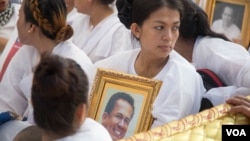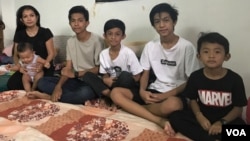On July 10 last year, independent political analyst Kem Ley was killed by a gunman, who shot him point blank at a gas station in central Phnom Penh. The assassination of the popular commentator, who often criticized the government and social injustice, sent shockwaves through Cambodian society and shows the country struggles to move beyond its history of political violence and impunity.
The alleged killer was detained and sentenced to life in prison, but ensuing court proceedings against Oeut Ang - who infamously gave his name as Choub Somlab in court, which means “Meet Kill” in Khmer - raised many questions. Evidence of contacts between Oeut Ang and officials from the ruling Cambodian People’s Party and the military, the limited mandate of the court hearings, and the release of security camera footage from the morning of the shooting fueled allegations that there were deeper forces at work.
Kem Ley’s widow, Bou Rachana, and her five children fled Cambodia for another country and are awaiting their appeal for political asylum in a third country. Early last month, Bou Rachana spoke to VOA Khmer reporter Sok Khemara from an undisclosed location about the murder case and her family’s plight.
Question: Greetings, Mrs. Bou Rachana. Thank you very much for giving VOA this interview today on July 2, 2017. First, I would like to ask you if you have any words or any (Buddhist) arrangement set out for the one-year anniversary of your husband's death?
Answer: Greetings. Now, it is nearly one-year anniversary of his death. However, it is impossible for me to hold a ceremony for him because I am in this country… Perhaps when that day comes, I would just cook and bring the food to (Buddhist) monks in order to offer blessings to him.
Q: Will there be a one-year death anniversary for him and how will it be arranged?
A: Yes, the anniversary will be held at his hometown (in Takeo Province) where his body was buried. My mother-in-law will prepare it. I cannot attend the event and I regret it very much. I can only help from afar and not much either.
Q: The court case on your husband’s murder was closed several months ago. Do you think the struggle to find justice will continue?
A: Personally, I still have hope that I will get justice one day.
Q: Will you file further legal complaints in the future?
A: I cannot confirm for now. Let's wait and see what is going to happen next, then we will act.
Q: There have been a lot of reactions to Mr. Kem Ley's death from both Cambodians living inside and abroad. Do you think that such pressure can bring about justice?
A: Since my husband was killed until now, I have not received a speck of justice at all. I do not acknowledge the (guilt of) arrested murderer, whose name is Choub Somlab, and who was handed a life sentence. I also do not acknowledge that he killed my husband on the grounds that he claimed my husband owed him $3,000. I do not acknowledge any of this.
I have nothing to say about the sentence on Choub Somlab by the court. This is the court's business; it opened and closed the trial on its own. I do not acknowledge the process. We and other Cambodians already know that Cambodian courts do not provide justice for the victims and the innocent.
Until we see the real murderer will we not accept the process. We cannot merely randomly accept any random person (as guilty). This is not just me; Cambodians in the country and abroad also know ‘who is who’.
Q: Did you ever meet or know anything about Choub Somlab before?
A: I have never known Choub Somlab, nor have I met him in person. When my husband went to provinces, I went along with him. I always went with him to attend events because I want to be an encouragement as he works to serve the society. That is why I always encourage him. That is also why I can't knowledge what was claimed after his killing, because I know my husband best.
Q: Now, the United Nations or foreign embassies are ready to help arrange your departure to a third country. How is that going?
A: In terms of the request for a safe haven, the UNHCR (UN Refugee Agency) has registered us and provided us with an identification card, so that we are legible to live this country. However, no further actions have been taken so far, and I am still waiting to hear from them.
Q: So far, what is it like living in the second country as you prepare to leave for the third one? What challenges have you faced?
A: Well, since I arrived here, I have been waiting. It has been a year already. The most difficult thing for me is that my children cannot study here. It really upsets me. Moreover, we cannot move about freely as when we were back home. We are living in a 4-by-4 square-meter rented room for six people. It is so hard for me mentally.
Q: How are your children after having not seen their father for a year?
A: My children knew that their father was killed. There are days when they say: ‘We already parted from father, and we already came to live in the other country, why don't we get to study?’ And they are upset. They want to study, but they cannot.
Q: How about the food? Do your children have problem with the food here?
A: It is somehow hard for them. Their only favorite food here is fried pork. It is the same at home. They do not eat much. And since their father died, they eat even less. I do not really know what is on their mind. Nowadays, I am both a mother and a father. I have to carry double duties.
So, it is my difficult for me. First, my husband is gone, so there is no one to guide and instruct my children. Second, they cannot go to school. I am worried because when my husband was alive, my children never missed a day at school. So I feel guilty towards my husband that my children cannot study.
Q: In late June, four human rights workers and a National Election Committee member, who worked closely with Kem Ley on social issues, human rights, and freedom of expression, were released from prison. How do you feel about their release?
A: I am very happy seeing them freed. I thought of my husband… Our family is happy to do things for the sake of freedom and justice in society. We need to push for their release, and now it has happened as my husband would have wanted.
That is when I miss my husband, when I saw them reunited with their wife and husband in all five families. However, I already am apart from my husband and can never reunite with him. When those activists were in detention, we thought that it is hard for their family living without their father. So, I am happy for them when they have their freedom back, but I miss my husband. He is gone to the point of no return, I am still so shocked. And to see my children like this, I am hurt even more.
Q: Do you have any words for Kem Ley's supporters or the authorities?
A: I would like to call on the people in the country and overseas to stand up for justice and the court to become independent. We have to stand up together, and I hope authorities will find justice for the poor and the innocent who have lost their land and have been suppressed mentally. Please stop hurting our citizens and look at how much they have suffered.








